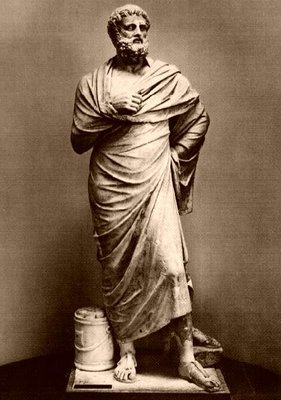
05 Jan Early representations of Christ and the apostles
An early representation of Christ found in the Catacomb of Domitilla shows the figure of Christ flanked by a group of his disciples or students. Those experienced with later Christian imagery might mistake this for an image of the Last Supper, but instead this image does not tell any story. It conveys rather the idea that Christ is the true teacher.
Christ draped in classical garb holds a scroll in his left hand while his right hand is outstretched in the so-called ad locutiogesture, or the gesture of the orator. The dress, scroll, and gesture all establish the authority of Christ, who is placed in the center of his disciples. Christ is thus treated like the philosopher surrounded by his students or disciples.

Comparably, an early representation of the apostle Paul (left), identifiable with his characteristic pointed beard and high forehead, is based on the convention of the philosopher, as exemplified by a Roman copy of a late fourth century B.C.E. portrait of the fifth century B.C.E. playwright Sophocles (right).



No Comments